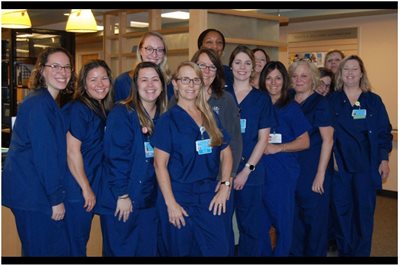

Posted Feb 13, 2020 at 12:52 PM
Updated Feb 13, 2020 at 12:52 PM
EXETER -- The Family Center at Exeter Hospital has implemented several initiatives to decrease the use of narcotics and other medications in both mothers and newborns. These advances are in line with an overall emphasis on care that keeps mothers and infants comfortable while reducing reliance on medications that have potential to become addictive or have other side effects.
In April of 2019, the Family Center adopted the Eat Sleep Console (ESC) model of care, which was developed in response to the increase in number of infants born after being exposed to addictive opiate drugs while in the womb. Rather than treating these newborns with pharmaceuticals to treat symptoms of neonatal abstinence syndrome, the model stresses family involvement in treatment of these babies, with as needed use of medications. Since adopting ESC, the Family Center has seen the average hospital stay drop from 11 days to 6 days.
“The ultimate goal is to get the newborn through withdrawal safely with the least amount of symptoms while providing family-centered, inclusive care,” said Michelle Savoie, Director of the Family Center. “We have had great success and positive feedback from the patients we have cared for.”
For mothers who deliver via Cesarean, the Family Center has employed a new routine of scheduling regular doses of non-narcotic pain medication in an effort to decrease the amount of narcotics patients take postoperatively.
“Since we began this approach, we have seen approximately a 50 percent reduction in the amount of narcotics taken with about 20 percent of recovering mothers not requiring any narcotics,” said Nicole Fowles, Nurse Clinical Leader in the Family Center. “This is another way the Family Center is doing our part to respond to the opiate crisis on a local level while working to provide optimal outcomes for our patients.”
Lastly, the Family Center has adopted an evidence-based approach to treating potential cases of neonatal sepsis, a bacterial infection in the blood that can develop in the first days after birth.
Because early signs of sepsis can be uncertain, the infection must be verified through testing. Historically, aggressive antibiotics have been started preventatively before test results confirm a positive diagnosis.
By implementing the use of the Neonatal Sepsis Risk Calculator, staff now have a more evidenced based tool to assess risk and antibiotics are not automatically started. Staff are now able to treat only the babies who really need it. The Family Center has seen a 77 percent drop in antibiotic use over the past year and no adverse outcomes.
“As nurses we recognized the disruption to the bonding process, an extended length of stay, as well as excessive needle sticks,” said April Henry, Clinical Practice Leader in the Family Center. “As a unit, we have been able to keep our moms and their babies together, get them home sooner, and not subject them to any unnecessary treatment, while improving the family’s birthing experience.”